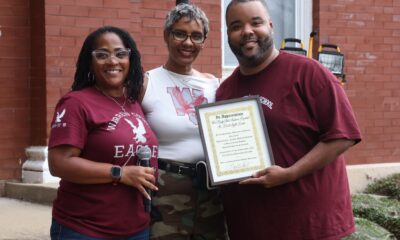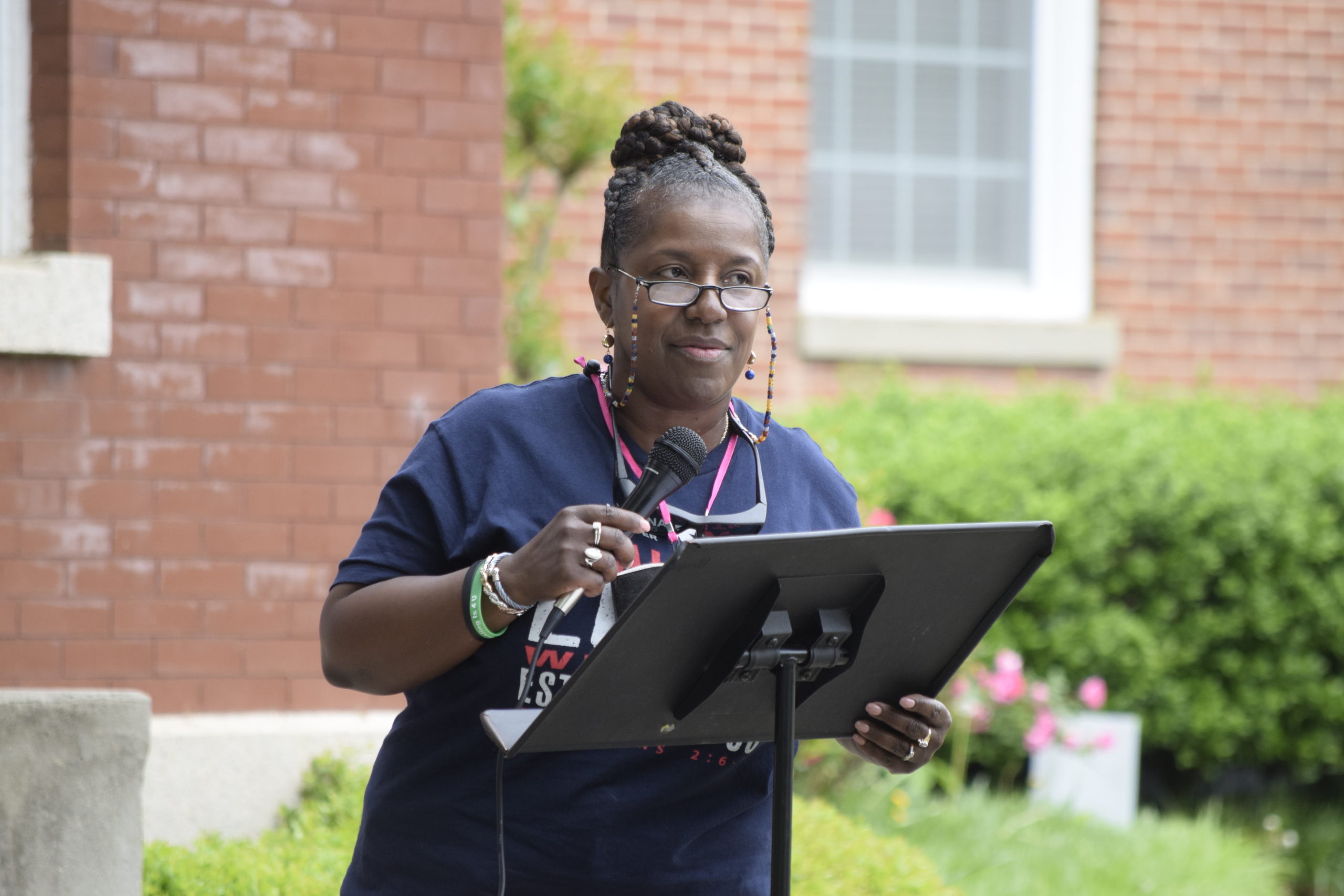Community
‘Liberating Futures’ Series Continues with Discussion on Sharecropping and Black Land Ownership
The fourth panel in the “Liberating Futures: Erasures, Reckonings, and Transformations” series of public discussions

The fourth panel in the “Liberating Futures: Erasures, Reckonings, and Transformations” series of public discussions continues on Saturday, June 4 at 11am in the Warren County Memorial Library community room.

The “Ties to the Land: Sharecropping, Black Land Ownership, and Black Land Loss” panel brings together a group of policy analysts, activists, attorneys, and farmers to reflect on the systems that have simultaneously connected Black farm families with the land and challenged their ability to own the fields in which they’ve labored for so many generations.
Panelists will discuss the legacy of sharecropping and Jim Crow farm practices, address the organized challenges being mounted against government policies that discourage and decimate Black farm ownership, review the relationship between land ownership and generational wealth, and offer strategies for reclaiming a future for Black farming.
PANELISTS:
• Patrick Brown – Fourth generation Black farmer, using conservation and regenerative agricultural practices and promoting Community Supported Agriculture (CSA) programs
• Phyllis Craig-Taylor – Professor of Law and former Dean of the NCCU School of Law; a member of the Heirs Property Retention Coalition, and a board member of Land Loss Prevention, Inc.
• Mary Somerville – Minister, lifetime farmer, community activist, and North Carolina’s first Black female jailer
MODERATOR:
• Tracy McCurty – Co-Founder and Executive Director of the Black Belt Justice Center, a legal and advocacy nonprofit organization dedicated to the preservation and regeneration of African American farmlands and land-based livelihood
The “Liberating Futures” series is a collaborative project of The 1921 Project, the Warren County Branch of the NAACP, the Warren County African American Historical Collective, UNC’s Descendants Project, and UNC’s Humanities for the Public Good Initiative.
This event is free and open to the public.
Community
Green Rural Redevelopment Organization Launches Eva Clayton Rural Food Institute, Will Host Rural Food Forum
The 2023 Rural Food Forum to convene subject matter experts at Vance-Granville Community College January 12.

The Green Rural Redevelopment Organization, with the help of the honorable Eva Clayton, is set to launch the Eva Clayton Rural Food Institute and host the inaugural Rural Food Forum scheduled for Thursday, January 12, at 8:30 a.m. at the Vance-Granville Community College Civic Center.
The Green Rural Redevelopment Organization (GRRO), founded in 2012 with a vision to revitalize rural communities across NC and focus on poverty, food insecurity, and chronic health issues, is excited to launch the new Institute named in honor of board member and the first African-American woman to represent North Carolina in Congress Ms. Eva Clayton.
“I am a Board Member of GRRO and continue to be impressed with its founders Ardis and Henry Crews. I believed in the vision and mission of the Institute and how it could help rural communities across North Carolina,” said former Congresswoman Clayton. “I want to play a significant role in its success. The data in most rural counties in North Carolina clearly show high levels of food insecurity, poor health indicators, weak school systems, and weak economies. Rural North Carolina is home; I care and have a responsibility to help make it a healthy, better educated, more prosperous, and engaging community where I can.
The launch of the Eva Clayton Rural Food Institute will take place during the organization’s inaugural Rural Food Forum on Thursday, January 12.
The forum will convene leaders, community members, rural farmers and a host of influential guests to discuss existing programs, resources and opportunities to address challenges and solutions to create sustainable economic growth in rural communities through the creation and increased utilization of rural farming and equitable food systems.

Congresswoman Eva Clayton
“This is an extraordinary opportunity for our organization and the people in rural North Carolina, said Henry Crews, executive director of GRRO. “Ms. Clayton has dedicated a large part of her life to fighting for rural communities, equitable care, and access to nutritious food, and we can’t think of a better way to tap into that knowledge. The forum is how we share knowledge, resources and bring others to the table to ensure a healthier rural NC together.”
Key speakers include Stacy Dean, Deputy Under Secretary for USDA’s Food, Nutrition, and Consumer Services; Debra Farrington, Deputy Secretary/Chief Health Equity Officer NC Department of Health and Human Services; Bob Etheridge, State Executive Director, USDA Farm Service Agency (FSA) in NC; Dr. Norbert Wilson, Director of Duke University’s World Food Policy Center; Honorable G.K. Butterfield, Former Congressman First District of North Carolina and a host of other community leaders and advocates.
While the forum is free, registration is required to ensure adequate seating and food accommodations.
See the full forum agenda at: grronc.org/rural-food-forum

Community
What is the Average Commute in Warren County, NC
Stacker compiled statistics about the average commute in Warren County NC using data from the U.S. Census Bureau.


ddisq // Shutterstock
See what the average commute is in Warren County, NC
American commutes are getting longer, with a U.S. Census Bureau report released in 2021 revealing the average one-way commute in 2019 reached a record high of 27.6 minutes. Combined with high gas prices, workers’ daily commutes are increasingly time-consuming and expensive—so much so that some are calling for commutes to count as part of the workday.
Even worse are travel times for “super commuters“—that unlucky 10% of Americans traveling more than one hour each way to punch a clock.
Stacker compiled statistics about the average commute in Warren County using data from the U.S. Census Bureau. Statistics are calculated based on 2020 5-year estimates. Warren County has a longer commute than five out of six neighboring counties, with Nash County, NC having the shortest commute at 23.5 minutes.
Warren County commuting by the numbers
– Average commute: 27.4 minutes
— 9.8% higher than state average
— #29 worst commute in the state
– Workers with 1+ hour commute: 9.1%
– Workers who drive to work: 93.9%
— Workers who carpool to work: 11.6%
– Workers who take public transport to work: 0.1%
– Workers who work from home: 2.4%
– Left for work between 12 a.m. and 6 a.m.: 15.0%
– Worked outside county of residence: 52.1%
Commutes in neighboring counties
#1. Nash County, NC: 23.5 minutes
#2. Halifax County, NC: 24.6 minutes
#3. Mecklenburg County, VA: 24.7 minutes
#4. Vance County, NC: 24.9 minutes
#5. Northampton County, NC: 26.0 minutes
#6. Warren County, NC: 27.4 minutes
#7. Brunswick County, VA: 32.9 minutes
Counties with the best commute in North Carolina
#1. Swain County: 19.0 minutes
#2. Hyde County: 19.6 minutes
#2. Jackson County: 19.6 minutes
Counties with the worst commute in North Carolina
#1. Gates County: 36.9 minutes
#2. Currituck County: 35.1 minutes
#3. Perquimans County: 34.4 minutes
Community
Warren County Memorial Library Hosts Oasis Spaces: North Carolina Green Book Project
The Warren County Memorial Library will host the “Oasis Spaces: North Carolina Green Book Project, 1933-1966” exhibit through January 31st.

The Warren County Memorial Library will host the “Oasis Spaces: North Carolina Green Book Project, 1933-1966” exhibit through January 31st. The exhibit is made possible through a partnership with the North Carolina Department of Natural and Cultural Resources as part of the North Carolina African American Heritage Commission.
The exhibit reflects the Heritage Commission’s research about “The Negro Motorist Green Book,” which identified business that in essence served as “oasis spaces” for African American travelers during the time of segregation. The book was both a travel guide and a tool of resistance designed to confront the realities of racial discrimination in the United States and beyond. It listed over 300 North Carolina businesses including restaurants, hotels, tourist homes, nightclubs and beauty salons.
“We are pleased to present this exhibit for the community to explore a part of history that has been overlooked,” said Library Director Christy Bondy.

Oasis Spaces: North Carolina Green Book Project / Submitted photo
The library has several programs planned that accompany the exhibit including film screenings, and a virtual visit with author, Calvin Ramsey.
The Green Book Project was made possible in part by the Institute of Museum and Library Services.
The Warren County Memorial Library is located at 119 S. Front St., Warrenton, NC.
For more information about the Green Book project, visit www.wcmlibrary.org.
-

 Entertainment8 months ago
Entertainment8 months agoPHOTOS: DubFest 2024
-

 Education8 months ago
Education8 months agoALL SMILES: Dr. Carol Montague-Davis Meet + Greet (Photos)
-

 Entertainment10 months ago
Entertainment10 months agoPHOTOS: Jazz on the Farm @ Heritage Cultural Farm
-

 Local8 months ago
Local8 months agoEAGLE PRIDE: WCHS Meet + Greet 2024 (Photos)
-

 Local10 months ago
Local10 months agoPHOTOS: Ridgeway Cantaloupe Festival 2024
-

 Local8 months ago
Local8 months agoPHOTOS: Soul City Homecoming 2024
-

 Community3 years ago
Community3 years agoPHOTOS: National Day of Prayer 🙏
-

 Local9 months ago
Local9 months agoPHOTOS: 3rd Annual Dinner Off Main







